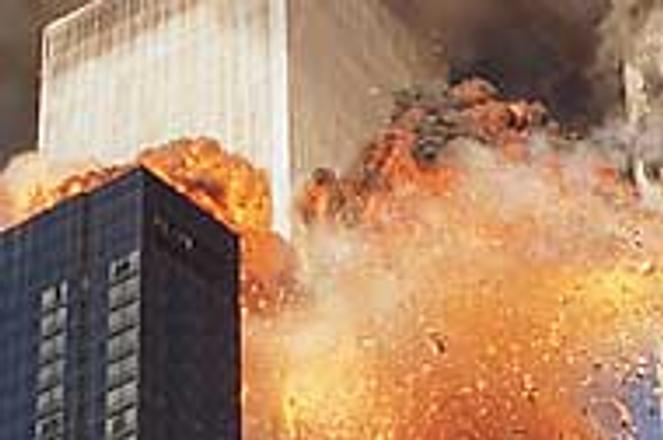THE SEPTEMBER 11 attacks on the US have increased appetite for international integration, say diplomats.photo: TASR
AS SLOVAKIA prepared to honour the first anniversary of murderous attacks on the United States on September 11, 2001, foreign policy experts said the country's efforts to join Western alliances had indirectly been aided by the international response to the terrorist actions.
The attacks, which killed over 3,000 people in New York, Washington and Pennsylvania, strengthened resolve in both the European Union and Nato to bring new members into alliances supporting democratic principles, diplomats said.
The change had made it increasingly likely that Slovakia would be invited to join both the EU and Nato at summits later this year, despite continued fears that democracy had not yet taken firm root in the young central European nation.
"If there was any impact [on EU expansion], it was in the tendency to say: 'Well, we definitely have to go ahead, because we will not only increase an area of political stability, but also enhance security.' And therefore we considered it a priority to go ahead," said Eric van der Linden, head of the European Commission delegation in Slovakia.
"The EU now understands better the importance of unity and security, and there is a strong interest in speedy enlargement and speedy integration of candidate countries," agreed Vladimír Bilčík from the Slovak Foreign Policy Association (SFPA).
The government of Prime Minister Mikuláš Dzurinda, which defeated its authoritarian predecessor in 1998 elections largely on a Western-oriented foreign and domestic policy, responded immediately to last year's attacks with concrete expressions of solidarity with the US.
Dzurinda visited New York in November 2001 to run in the city's annual marathon, despite his lack of training, saying: "I will not run a world record, but I'm going to New York to show the solidarity of Slovaks with this city on the side of democratic forces striving to defeat terror."
That gesture, as did the many that followed, won accolades from Nato-member countries. "Most of all the people of Slovakia showed enormous solidarity with the United States after the attacks," said Paul Oglesby, a spokesman with the US embassy in Bratislava.
The Slovak government on September 22, 2001 also opened Slovak airspace for overflights by US and Nato military aircraft participating in the military operation in Afghanistan, which was believed to have been the base from which the terrorists operated.
Slovakia later sent 40 military engineers to help rebuild the airbase in Bagram, Afghanistan, following the Enduring Freedom operation. The last members of the group arrived on location August 27, 2002, and were to start work September 8.
"Slovakia has clearly condemned these attacks, condemned terrorism as such, and has joined the international anti-terrorist coalition," said Foreign Ministry spokesman Boris Gandel.
"Our actions have been welcomed by our partners and have helped us score points on the international scene."
Gandel added that Slovakia's response had increased the likelihood of the country's being invited to join Nato at the Alliance's November expansion summit in Prague.
"Our chances [of becoming Nato members] have been increased not only by our verbal support, but also by the concrete steps we have taken. We have shown that we are prepared to act as if we were already Nato members," he said.
Nato officials, after earlier considering admitting only one or two new members in Prague, after 9/11 began talking of an expansion round of as many as nine new countries.
"September 11 reinforced the need for coherence to answer the threat of terrorism. Canada is pushing for an expansion of Nato, which would also include Slovakia and which would allow us to find a better answer to that threat. Slovakia's reaction has cearly increased its chances [of becoming a Nato member]," said Oliver Nicoloff, deputy chief of mission with the Canadian embassy in Prague, which is also responsible for Slovakia.
According to economic analysts, the terrorist attacks have also contributed to the stability of the Slovak currency this year, despite the fact a related slow-down in the global economy has hurt Slovak exporters.
"Our advantage has been that foreign investors are looking for places to put their money which are relatively secure," said Istrobanka analyst Marek Senkovič. "This region can bring some satisfaction in the form of profit, high currency interest rates and relative stability. This has contributed to the fact that the Slovak crown exchange rate has been stable throughout the year.
"On the other hand we have seen shares in America going down. When they go down it shows that the economy is sluggish, and when the American economy is sluggish the economy of western Europe turns sluggish as well," the analyst said.
"Without the terrorist attacks Slovakia would now be in a better position because our exports are very much dependant on the economies of the US and Europe."
Slovakia registered a trade deficit in the first seven months of this year of almost Sk49 billion, only Sk1 billion less than the figure in the same period last year. In 2001 Slovakia recorded a record Sk103 billion trade deficit, drawing warnings from international bodies that fiscal spending had to be cut, and that the deficit could put pressure on the currency.
However, Senkovič said that on balance Slovakia seemed to have emerged from the global slowdown relatively unscathed, and that the country would continue to prosper from being perceived as a relatively safe investment destination.
"Every crisis has its advantages," he concluded.


